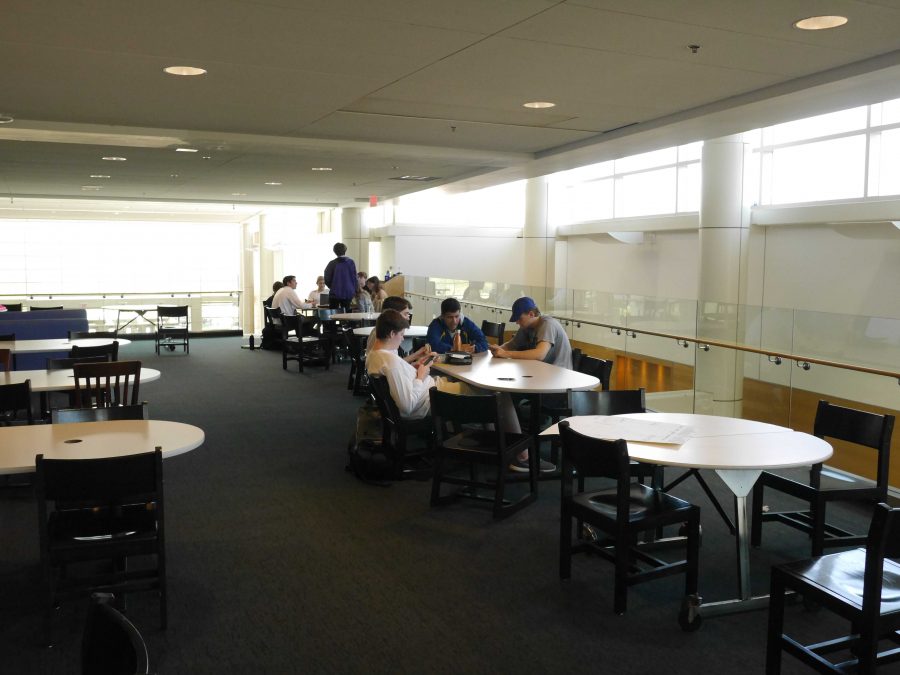High school free periods: one of the most difficult blocks of time for faculty and administrations to oversee. Students have wrestled all year with the current attendance policy, and the fight has shown that students simply don’t want to spend a 7-hour-day confined in a classroom or to a library couch–if they’re lucky. Seniors have retained their off-campus privileges, while the rest of us non-seniors are bound to cramped classrooms. Within study-hall, few are offered the freedom to travel down to the library–and understandably so–because the library is strictly for studying.
The library varies drastically depending on where you decide to seat yourself. To the right of the library is the silent study room and multiple cubicles. Both areas work great for blocking out the distractions around you. To the left, you find yourself in what I like to think of as the pit: the many tables that surround the library help desk. The pit is no stranger to rowdy teenagers justifying why they aren’t working to the librarians, which is often a commotion in and of itself. As the student pleads his case to stay in the library, he knows all too well that commons is the designated lounge area.
When students aren’t doing work in the library, they are often told they must go to commons or the cafeteria. So the student–more often than not–packs up his backpack and scrambles for any open table in the heavily senior-dominated commons. If said student were in study-hall, then constant pestering–eventually leading to punishment–is typically the solution for a student who takes a break during his study hall. What Lake Forest High School needs in place of sending its students to the dean’s office is an organized method to assist students in balancing work and leisure.
The bottom line is: Lake Forest needs more lounging areas outside of the busy commons and cafeteria that students in study hall cannot report to. As stated, study hall students are confined to either their classroom or the library below. Student’s workloads vary greatly throughout the week, which can often affect their work ethic in study-hall. Sometimes it feels as though faculty forgets that the student body has rigorous tests, quizzes and homework assignments throughout the week but beyond that, it seems they forget we have other things going on outside of school that require us to simply take a break during our 45-minute study hall, but if you’re not doing work there is no excuse, because to them it is purely the desire to be defiant.
Say a student reports to the library for study-hall after a long test and has no desire to sit down for another 80 minutes of work. In place of the work, the student takes out his chromebook to surf through YouTube. A librarian approaches and tells the student that he must be doing work if he’s in the library, which prompts the student to reply, “But I’m in study-hall. I have to be here.” The librarian replies, “Then you have to be doing work.”
It’s really as simple as that. I myself have had the simple yet pointless conversations many of us students have had with the librarians who attempt to force study hall students to either go to commons or take work out. The study hall students have no choice but to then take a folder and try to get away with doing as little work as possible and just try to relax after a test. These student experiences exhibit the very little freedom that us freshman-juniors have at LFHS. We continue to grind out ACT/SAT scores, AP Exams, tests/quizzes, all while balancing jobs and extracurriculars in order to prepare us for the next chapter of our lives whether that be the workforce or college.
In whichever speed they so choose, students are continuing to grow into young adults and have earned the right to decide what to do with their study hall. I’m not advocating for a curriculum more similar to college in which we come and go as we please because there surely are liability issues in that, but what I am advocating for is students having more mobility in their free periods for leisure, work, or extracurricular activities.
More freedom during free periods doesn’t mean all students will suddenly disappear from designated study areas. Students don’t do their work because they have to, they do it because they want to. If students want to exercise their right to relax, then it only continues to support the idea of mindfulness that is being spread around the school like humidity in the air. Lastly, it prepares students to be able to manage their time when they have the freedom to do so in both their job and college because never again will students face a library threatening them with a trip to the deans if they do not do their work.








